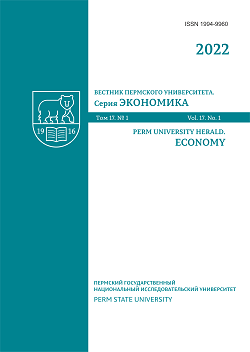Vol. 17 No. 1 (2022)

The first issue of the 2022 “Perm University Herald. Economy” starts with an article devoted to the key approaches and prospects in the structural studies of the modern Russian economic school. The paper justifies the need to consider structural changes at different levels of an economic entity in terms of multiple interconnected factors and concludes about a promising future of differentiating the management methods, evaluating the power of the applied tools in terms of structure and macrogoals which could be determined by the theory of structural dynamics.
A section “Regional and Municipal Economy” 1) describes the evaluation methodology for education infrastructure accessibility in the regions of the Russian Federation, justifies the need for a multi-criteria evaluation with object, digital, and transport components, applies the methodology to evaluate the education infrastructure accessibility in the regions in the Ural and Volga Federal Districts; 2) proposes economically sound, the RF legislation compiled rental rate calculation methodology for the state- and municipal-owned no-bid land plots, and tests the methodology by comparing the actual and calculated rental rate payments to the budget of Perm Krai in 2020.
A section “Enterprise Economy and Management of Enterprises, Organizations, Branches, Complexes” 1) looks into the key concepts and principles of an ecologically friendly (green) energy sector and the reasons for the global industry shift to the renewable energy sources, analyzes the current level and prospects of green economy, examines the problems of the shift to the renewable energy sources, outlines different paths for the development of the Russian oil and gas services business in the transition period to green economy, offers possible prerequisites for business’s sustainable development; 2) proposes a structural logic strategy model for the institutional transformations of industrial complexes in digital economy and a methodological approach to the choice of type and synthesis of the specified strategy, describes the key components and characteristics of the model, designs an imitational model of the industrial complex’s transformation and development in digital economy, identifies the most reasonable strategic priorities and types of transformation strategy for the industrial complexes in Voronezh, Lipetsk, Kursk Regions and other areas to test the proposed models and methodological tools; 3) describes an organizational economic mechanism for introducing category management in a company’s assortment strategy with the focus on the second-fourth stages of company’s assortment lifecycle, attempts to introduce the author’s mechanism into a trading company at its first stage of assortment lifecycle, gives the results of this introduction, which help improve the mechanism with regard to a management algorithm for the goods categories, the mechanism being applied by the companies at their first stage of assortment lifecycle.
The last but not least paper in a section “Current Issues of Accounting, Auditing and Economic Analysis” raises the issues of the professional education in interdisciplinary areas, including forensic accounting; outlines a set of skills for a forensic accountant, develops an educational training model for these specialists. The paper both defines and groups globally recognized skills and knowledge of forensic accountants and describes the key elements of the training model in a modern practice-driven competency-based approach.









